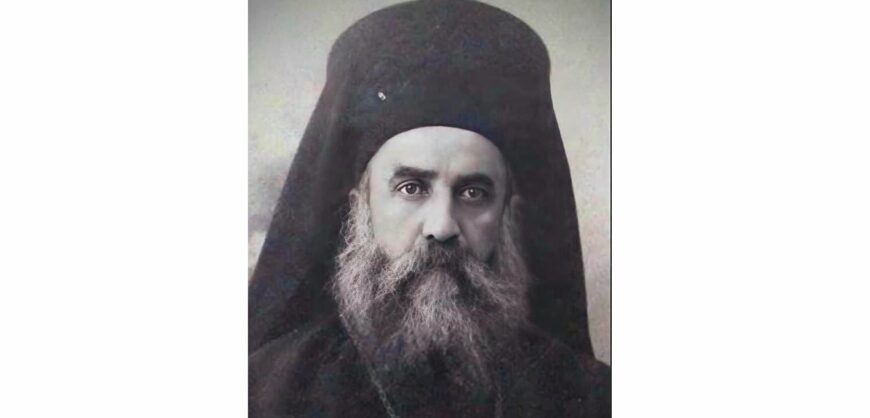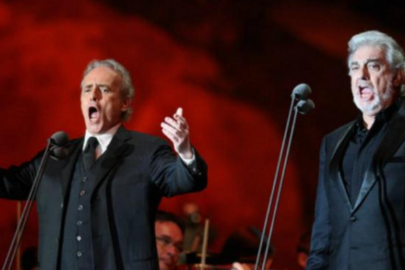This past week, I had the chance to see the film “Man of God” written and directed by Yelena Popovic. It is a cinematographic tribute to the final thirty years of the life and ministry of St. Nectarios of Pentapolis, spanning the period between 1890-1920, beginning with his removal from the Patriarchate of Alexandria, his appointment as Director of the Rizareios Seminary, and the establishment of his convent in Aegina and falling asleep in the Lord.
This film has been widely discussed, in part because it featured exceptional actors from Greece and abroad. It received mixed reviews from critics, but enjoyed great success at the box office and sparked interest among moviegoers and the general population.
As I watched the film, my thoughts turned to silent movies. Here is why.
Some months prior to the start of the shooting of this movie, I received a telephone call from its director, Mrs. Yelena Popovic, during which she asked for copies of my studies on St. Nectarios. I advised her to wait until November 2019, when my two-volume publication on the saint was set to be published in both Greek and English, which would provide her with ample information to write her script.
Together with her husband Alexander, the director did in fact come to the book presentation for my study, which was organized by the Director-General of the Church of Greece’s publishing house and missionary arm Apostoliki Diakonia, His Excellency Metropolitan Agathangelos of Fanarion, at the Gennadios Library, and purchased the English-language version of my books.
She would call me from time to time – especially during filming – to ask for information on the saint’s ministry; particularly at the Patriarchate of Alexandria and the Rizareios Seminary.
I had the honor of meeting Mrs. Popovic and her husband in Athens. Based on our conversations, I realized that she wasn’t at all interested in my comments regarding how well-received her film was by Greek audiences. On the contrary, she displayed an intense interest in learning about the personal experiences that I had in my life regarding this miraculous saint of the 20th century.
I realized that what interested her most of all was the audience’s ability to share in St. Nectarios’ suffering while watching the film, and not its commercial success or ensuring that it would become a box office hit and receive nothing but favorable reviews!
From my interaction with the director, I ascertained that I was dealing with a person of great faith, a laconic individual who preferred to keep a low profile, and who was primarily concerned with provoking thought and reflection among the audience, teaching them through silence, and saying much in as few words as possible or simply through the saint’s life of silence.
There is no doubt that the film “Man of God” is a creation that bears Mrs. Popovic’s unique signature, because through this film the qualities of her own character and personality shine through, as if we were watching a silent movie, with limited or non-existent dialogue, replaced instead with the deafening and relentless silence of the saint’s communication with those with whom he enters into dialogue and associates.
The saint’s outcry in the face of the injustices he was confronted with goes silent and his silence cries out! His silence was not a passive and disengaged position of cowardice, but rather, a virtue, which was altogether different from what we are used to seeing in our bustling society.
According to St. Isaac the Syrian, silence is the “language of the age to come…the eternal, supremely joyful heavenly kingdom,” and for St. John of Climacus, silence is the “mother of prayer, mystical spiritual progress, hidden spiritual elevation.”
The director gives her film the spiritual dimension of St. Nectarios’ ministry. Through his meticulous neglect or silence, the saint emulates the stance adopted by our Lord during His Divine Passion, which is why St. Sophrony of Essex says that “the silence of God is the most eloquent and polite response to our improprieties.”
Silence speaks louder than words and aims at seeing truth prevail. It is a lesson that remains timeless. The saint followed the path of silence, which has the power to bring God down to earth and speak to the souls of the people, to shape consciences, to work miracles, to lead us to repentance, contrition of the heart, and prayer.
Moses, who was blessed to see God with his own eyes, would communicate with God through silent prayer. He would supplicate Him from the innermost depths of his heart to stand by him in the face of difficulties and lead His people to the Promised Land. God would respond to Moses’ silence by saying: “Why do you cry out to me?” (Exodus 14:15). Moses’ silence would reach God as a loud outcry, and He would intervene, answer his prayers, and protect His chosen people from their enemies.
St. Nicholai Velimirovich notes that “there are three things about which you mustn’t hasten to talk: about God until you have strengthened your faith in Him; about the sin of another until you have come to know your own; and about what tomorrow will bring.”
Silence is the bulwark that holds back the raging rapids of empty talk. It is a type of heroic behavior and spiritual work against the “boldness” of impertinence and gall, the “side chatter” through which we don’t enter into dialogue and communicate, as the Nobel laureate George Seferis would characteristically say.
St. Nectarios chose to meticulously resign himself from argumentation and debate, to keep silent, to exercise self-awareness, and to know himself in order to defend himself from the ongoing slander and defamation that he suffered for years, preferring to seek refuge through the protection of God.
St. Seraphim of Sarov’s insight was personified in the St. Nectarios’ holy life: Gain your inner peace and thousands of people around you will be saved, without you even knowing it.”
Truly, over a century after his righteous repose, St. Nectarios continues to teach, work miracles, save, and heal as a “Man of God!”
Metropolitan Cleopas of Sweden: Silent Cinema and the “Man of God”
St. Nectarios of Aegina is one of the most renowned Greek saints





































